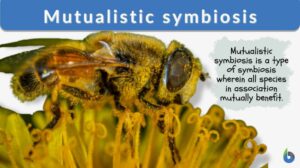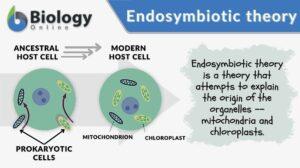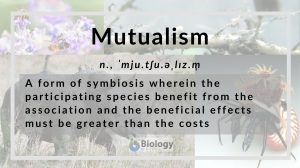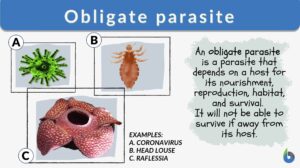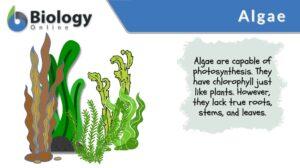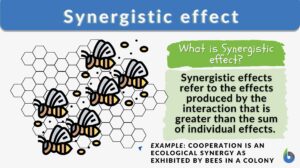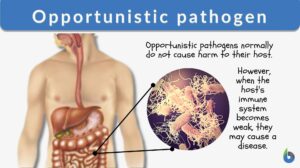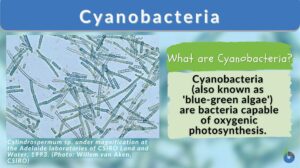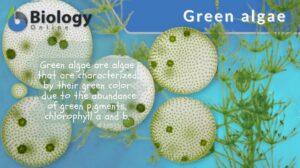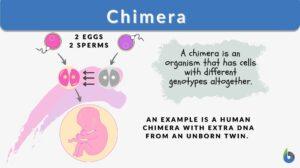Search Results for: symbiosis
Mutualistic symbiosis
Mutualistic Symbiosis Definition In order to understand what a mutualistic symbiotic relationship means, we will break down... Read More
Endosymbiosis
Definition noun A symbiosis wherein the symbiont lives within the body of its host Supplement Symbiosis pertains to a close... Read More
Parasitism
Organisms depend on different sources of food to survive. Larger organisms like plants make their own food (autotrophs) and... Read More
Commensalism
Commensalism Definition What is commensalism? Literally, commensalism is a Latin word that means ‘to eat at the same... Read More
Parasymbiosis
The ability of two different types of organism to exist closely with one another without giving an advantage or disadvantage... Read More
Endosymbiotic theory
A eukaryotic cell is distinct from a prokaryotic cell by the presence of membrane-bound cellular structures called... Read More
Obligate parasite
Parasitism is a form of symbiosis that occurs between a parasite and its host. The parasite is the organism that generally... Read More
Diazotroph
Definition noun, plural: diazotrophs A microorganism capable of assimilating and fixing atmospheric nitrogen... Read More
Synergistic effect
Synergistic Effects Definition In biology, synergistic effects are the effects when chemical substances or biological... Read More
Endoparasite
Definition noun, plural: endoparasites (parasitology) A parasite that lives within the body of the... Read More
Opportunistic pathogen
Opportunistic Pathogen Definition How do we define opportunistic pathogen? The opportunistic pathogen is an infectious... Read More
Endoparasitism
Definition noun (parasitology) A form of parasitism involving endoparasite Supplement Parasitism is one of the many forms of... Read More
Ectoparasite
Definition noun, plural: ectoparasites (parasitology) A parasite that lives outside the body of the... Read More
Ectoparasitism
Definition noun A form of parasitism wherein the parasite lives outside the body of the host (as opposed to a parasite... Read More
Cyanobacteria
Cyanobacteria Definition Cyanobacteria is a group of photosynthetic bacteria widely distributed in various aquatic habitats... Read More
Photosynthesis
Photosynthesis is a physio-chemical process carried out by photo-auto-lithotrophs by converting light energy into chemical... Read More
Non-living thing
Non-living Thing Definition A non-living thing in biology means any form without a life, such as an inanimate body or... Read More
Green algae
Green Algae Definition Green algae (singular: green alga) are photosynthetic algae that are characterized by having... Read More
Equilibrium
Equilibrium Definition In Biology Equilibrium refers to the state of balance and stability. In biology, equilibrium is... Read More
Chemosynthesis
Definition noun, plural: chemosyntheses The production of a more complex chemical compound by combining two or more simpler... Read More
Predator-prey relationship
Definition noun An interaction between two organisms of unlike species in which one of them acts as a predator that... Read More
Parasitology
Definition noun A scientific study of parasites, their hosts, and the relationship between the parasite and the... Read More
Competition
Definition noun (ecology) A symbiotic relationship between or among living things that compete for a limited resources,... Read More
Alloparenting-What Is It?
“Alloparenting—What Is It?” Sonja G. Rosas 13 September 2007 An Introduction To Alloparenting Every gregarious... Read More
Parasitoidism
Definition noun A form of parasitism wherein an organism (called parasitoid) lives on or inside the host at one phase in its... Read More
Kleptoparasitism
Definition noun A form of parasitism wherein an animal takes food or objects collected, caught, prepared, or stored by... Read More
New Zealand’s Unique Flora
By: Maria Victoria GonzagaIn the previous lesson, we've come to know some of the most fascinating endemic... Read More

